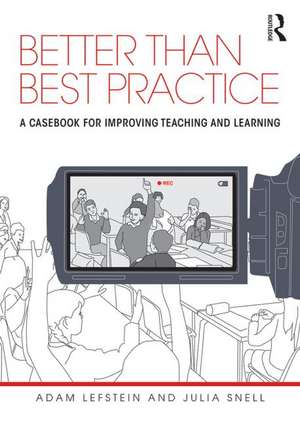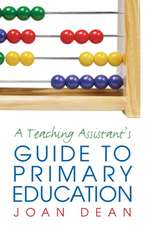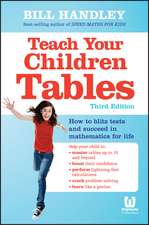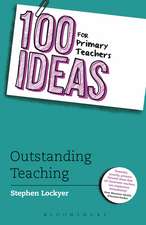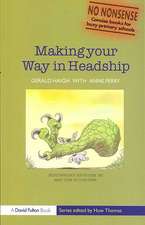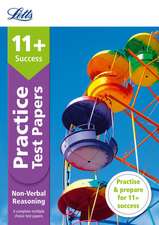Better than Best Practice: Developing teaching and learning through dialogue
Autor Adam Lefstein, Julia Snellen Limba Engleză Paperback – 16 dec 2013
Carefully chosen video clips from primary school literacy lessons show real teachers in a variety of often knotty situations: classroom conversations that take unexpected turns; grappling with assessment; managing disagreements, to name a few. The book explores the educational potential of classroom talk and, in particular, the promise and problems of dialogic pedagogy.
With an emphasis on the complexity and ‘messiness’ of teaching, Better than Best Practice considers how to learn from observing and discussing practice in order to develop professional judgment. It offers practical advice on how to organise and facilitate video-based professional development in which teachers share their practice with colleagues in order to learn from one another’s challenges, problems, dilemmas and breakthroughs.
This exciting new resource argues that critical discussions of practice, which highlight dilemmas instead of prescribing solutions, help to develop and support thoughtful, flexible, and insightful practitioners: an approach that is better than best practice.
Preț: 363.46 lei
Nou
Puncte Express: 545
Preț estimativ în valută:
69.55€ • 72.80$ • 57.89£
69.55€ • 72.80$ • 57.89£
Carte disponibilă
Livrare economică 10-24 martie
Livrare express 22-28 februarie pentru 30.07 lei
Preluare comenzi: 021 569.72.76
Specificații
ISBN-13: 9780415618441
ISBN-10: 0415618444
Pagini: 216
Ilustrații: 8 black & white illustrations, 6 black & white tables, 5 black & white halftones, 3 black & white line drawings
Dimensiuni: 174 x 246 x 15 mm
Greutate: 0.39 kg
Ediția:New.
Editura: Taylor & Francis
Colecția Routledge
Locul publicării:Oxford, United Kingdom
ISBN-10: 0415618444
Pagini: 216
Ilustrații: 8 black & white illustrations, 6 black & white tables, 5 black & white halftones, 3 black & white line drawings
Dimensiuni: 174 x 246 x 15 mm
Greutate: 0.39 kg
Ediția:New.
Editura: Taylor & Francis
Colecția Routledge
Locul publicării:Oxford, United Kingdom
Public țintă
Postgraduate and ProfessionalCuprins
List of tables and figures Acknowledgments Transcription conventions Section A – Where We’re Coming From 1. Better than Best Practice 2. Towards Dialogic Pedagogy 3. Setting the Scene: Working Towards Dialogue in a London Primary School Section B – Classroom Episodes Introduction: Practical Suggestions for Engaging with the Episodes 4. Breakthrough to Dialogue? Episode 1. Getting in to Narnia Commentaries David Reedy, Thinking collectively, backed by evidence James Cresswell, Art of Education: Balancing Direction and Dialogue 5. Responding to a Pupil Challenge; Episode 2: ‘I don’t really like that, Miss’ Commentaries Robin Alexander, Triumphs and dilemmas of dialogue Gemma Moss, Writing in the talk Greg Thompson, A Challenge (?) in the Interest of Dialogue Laura Hughes, The impact of dialogic teaching techniques – a teacher’s perspective 6. Importing Popular Culture into the Classroom; Episode 3: ‘So we’re going to have X Factor’ Commentaries Roxy Harris, Writing: Hard Slog, or Engaging and Entertaining? Janet Maybin, ‘Loads of really good words’ Dennis Kwek, Weaving Popular Culture: Towards Knowledge Building Laura Hughes, What did I learn at school today? 7. The Teacher’s Role in Classroom Debates; Episodes 4-5 Debating Football Commentaries Jeff Barrett, Developing Speaking Skills in the Shadow of Written Examinations: A Headteacher's Perspective Lucy Henning, What Role Is There For Organised Debate In A Literacy Lesson? Jayne White, Constraints and opportunities 8. Dialogue, Ability and Pupil Identities; Episode 6: ‘What does fear mean?’ Commentaries Mel Cooke, "‘Tightening the knot?’: fear, poetry and testing" Pie Corbett, "What the discussion of ‘The Owl’ made me wonder" Jennifer A. Vadeboncoeur and Louai Rahal, "On Practice, On Purpose" Glenda Moss, "The Complexity of Dialogic Teaching under the Shadow of Standardized Testing" 9. Discussing Pupil Writing in Whole Class Discussion; Episode 7: ‘I think there’s more to it than that’ 10. Using Empathy to Understand Character; Episode 8: ‘Tell me what you think as Wilbur’ Section C – Where to Go from Here 11. Continuing the Conversation: Parting Thoughts on Dialogic Pedagogy 12. Do It Yourself: Developing Teaching through Group Discussion of Video Recordings of Practice Methodology Appendix: Pedagogically Oriented Linguistic Ethnographic Micro-analysis
Descriere
This really is the book we’ve been waiting for. Better than Best Practice is not just another evangelising text about the need to move classroom talk beyond the default of closed questioning, recall answers and minimal feedback but an offering that is richer, more subtle and much more useful. Alongside a rigorous but accessible examination of the thinking and evidence behind dialogic pedagogy the book provides videographic and transcript case material of dialogue as it happens, together with contextual information and commentaries. This makes enthralling reading - and viewing - in its own right as well as superb material for professional discussion and development. But perhaps the book’s central virtue is that it lives as well as commends the dialogic principle. For this is a book of many voices - children, teachers, authors, researchers and invited commentators; and they do not necessarily agree, which is precisely the dialogic point. So it’s impossible to evade the message that dialogue is indivisible. If it’s good for young learners then it’s essential for their teachers – and for all of us.
- Professor Robin Alexander, Professor of Education Emeritus, University of Warwick and Chairman, The Cambridge Primary Review Trust, CU Faculty of Education
- Professor Robin Alexander, Professor of Education Emeritus, University of Warwick and Chairman, The Cambridge Primary Review Trust, CU Faculty of Education
